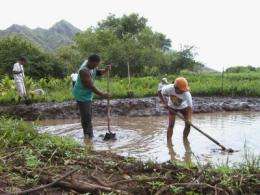Connecting science with culture

Hawaii's strong farming history and its indigenous people's relationships to 'aina (the land) and 'ohana (immediate and extended family) provide the landscape for an experiment in culturally relevant learning. Researchers from the University of Hawaii at Manoa transformed an agricultural and environmental science professional development course for K teachers to strengthen the community of educators and build stronger connections between science and culture. The results are reported in the 2010 edition of the Journal of Natural Resources and Life Sciences Education, published by the American Society of Agronomy.
The researchers' goal was to help teachers incorporate important topics related to the environmental and agriculture science fields into their curricula, and to make that content relevant to their students' lives and backgrounds, especially those of native Hawaiian decent. Hawaiian ways of learning are experience-based and highly interpersonal, and the course was developed to build a "community of practice," among the teachers. According to Traci Sylva of the University of Hawaii at Manoa, a community of practice is a "group of people who share a concern or passion for something they do, and learn how to do it better as they interact regularly."
The first two years of the course consisted of short instructional summer classes, with teachers incorporating projects into their curriculum during the school year. For the third year, the course was transformed to include a five-day immersion program at a remote location. Participants spent their time working together, learning from experienced instructors and experts in agricultural and environmental science, as well as Hawaiian culture. Science terminology and concepts, such as the nitrogen cycle and ecosystem and species interaction, were presented in ways to connect them to familiar Hawaiian practices.
Teachers who participated in the transformed course reported that they had more confidence in their ability to make culture-science connections, and that their understanding of the concepts improved. Interpersonal relationships between teachers and instructors were also much improved over the previous two years. Teachers report that student participation and satisfaction had improved with the project-based learning projects such as beach and park clean-ups.
Hawaiian classrooms do not need to be the only beneficiaries of culturally relevant learning. Unique cultures, environments and traditions exist across the country. The researchers conclude that problem-based lessons and activities should include model lessons and projects that engage the learners with knowledgeable people in their field. For teachers, this makes them more knowledgeable and comfortable in exploring the relationship between science and culture.
More information: View the abstract at www.jnrlse.org/view/2010/e08-0040k.pdf
Provided by American Society of Agronomy















